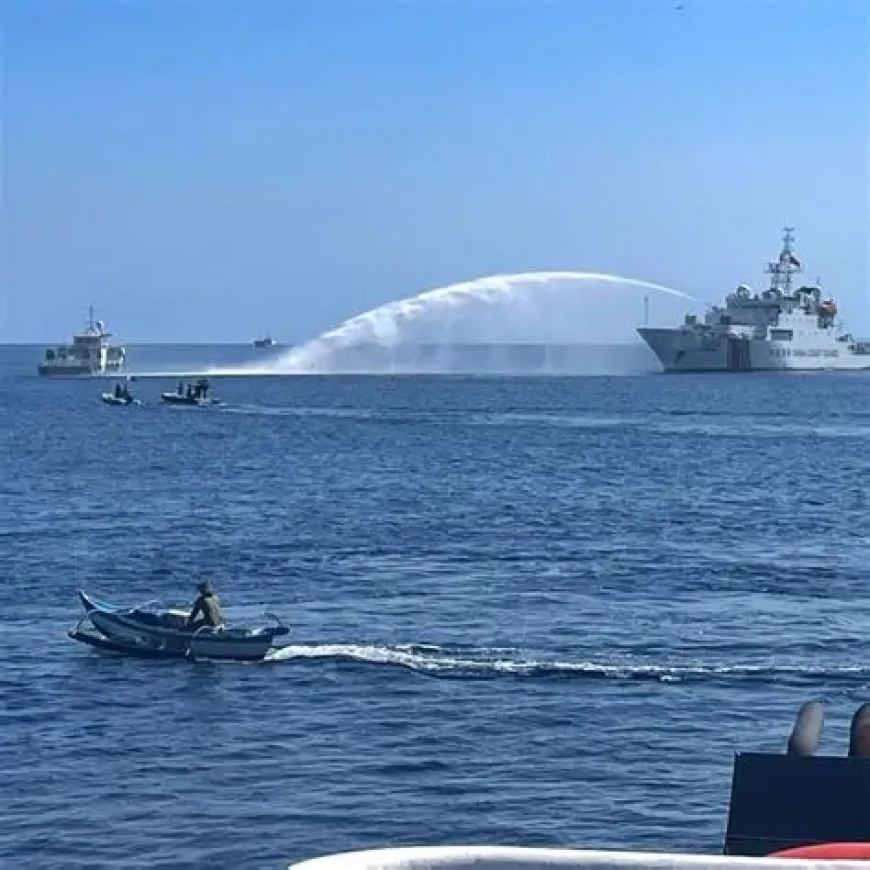China Fires Water Cannon at Philippine Ships in South China Sea

In a dramatic escalation of tensions in the South China Sea, China’s Coast Guard fired water cannons at Philippine vessels near the disputed Scarborough Shoal on Tuesday morning. The incident comes amid growing maritime friction between the two nations, as both assert territorial claims in one of the world’s most strategically important waterways.
Incident Details
According to official statements from Beijing, the Philippine ships entered waters China claims as its own, prompting the Coast Guard to employ water cannon tactics to “repel illegal operations.” Manila denies these claims, stating the ships were conducting routine patrols within the Philippine Exclusive Economic Zone (EEZ). Satellite images and video footage obtained by international media show a tense standoff between Chinese and Philippine vessels, with water streams from Chinese cannons visibly hitting the decks of Filipino ships.
Experts say that while water cannons are non-lethal, such encounters are extremely dangerous, especially when vessels operate in close proximity under high seas. Any miscalculation could easily lead to collisions, injuries, or escalation into military conflict.
Historical Context
Scarborough Shoal has long been a flashpoint in the South China Sea dispute. The shoal, located approximately 200 kilometers off the Philippine coast, is rich in marine resources and potential oil and gas reserves. The area is also a vital shipping lane, with over $3 trillion worth of trade passing through the South China Sea annually.
China claims nearly the entire South China Sea under its “nine-dash line” claim, a stance repeatedly rejected by the Permanent Court of Arbitration in a 2016 ruling that favored the Philippines. Despite this, China has maintained de facto control over several key maritime features in the area, including Scarborough Shoal.
International Reactions
The United States quickly condemned China’s actions, calling the deployment of water cannons “provocative and destabilizing.” The U.S. reiterated its commitment to defending the Philippines under the 1951 Mutual Defense Treaty and urged both sides to resolve disputes peacefully.
ASEAN nations have expressed concern over the escalation. Japan and Australia, key regional partners of the Philippines, issued statements urging restraint and adherence to international law. Analysts warn that continued confrontations risk destabilizing the broader region, particularly as China continues to expand its naval presence.
Environmental and Military Implications
China recently proposed designating Scarborough Shoal as a national nature reserve, ostensibly to protect coral reefs and marine biodiversity. Critics, however, argue that the designation may serve as a pretext for militarization. Analysts warn that infrastructure, such as surveillance posts and patrol stations, could eventually be built under the guise of environmental protection, further complicating international tensions.
“China’s moves here are both strategic and symbolic,” said Dr. Lin Wei, a maritime security expert at the National University of Singapore. “They are asserting control over a critical waterway, signaling both domestically and internationally that they will not cede maritime claims.”
Regional Implications
With tensions escalating, regional diplomacy is likely to be tested. The Philippines has pledged to raise the matter at the next ASEAN meeting, seeking a coordinated response. International legal experts emphasize that multilateral engagement, rather than unilateral confrontation, is the most sustainable path forward.
For now, the Scarborough Shoal remains a flashpoint, illustrating the fragile balance of power in the South China Sea and the potential for seemingly small incidents to escalate into major international crises.
What's Your Reaction?
 Like
0
Like
0
 Dislike
0
Dislike
0
 Love
0
Love
0
 Funny
0
Funny
0
 Angry
0
Angry
0
 Sad
0
Sad
0
 Wow
0
Wow
0


















